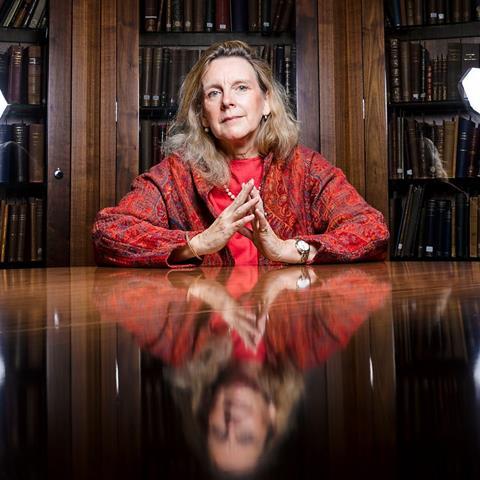Dr Gwen Adshead has spent more than three decades going into prisons and secure settings, including the infamous Broadmoor Hospital, working with people who have committed violent criminal offences. She talks to Tony Wilson about evil, justice and rehabilitation – and why revenge is not an emotion that humans can afford to indulge

There’s no denying that we live in a violent world. Our daily news feeds leave us in no doubt that people have an endless capacity to hurt one another. And we don’t need to spend too long examining our own behaviour to also recognise that we, too, can inflict pain on those around us.
Dr Gwen Adshead has spent her professional life understanding this tendency. Born in New Zealand, she moved to England aged 11. She pursued medicine as a profession, later focussing on psychiatry, and has years of experience working in hospitals and secure institutions with people whose violence has led them to carry out terrible crimes.
As a forensic psychotherapist of global renown, she has authored many papers and written books, including The Devil You Know: Stories of human cruelty and compassion (Faber & Faber). She was recently invited to deliver the BBC’s annual Reith Lecture series, opening a 4-part discussion about her experience of rehabilitating the criminally violent and the nature of evil.
Adshead describes herself as having a Christian upbringing, and attended schools where prayer was a daily part of life. The acceptance of mistakes and the offer of second chances is something that she says is paramount to how the Christian faith and her professional life interact. There but for the grace of God go all of us, she reminds me when we talk.
But hers is not an all-grace-and-no-consequences faith either. While she does not consider punishment to be an effective form of rehabilitation, she is “clear-eyed about the damage” caused by human cruelty. The most important part of her job, she says, is helping those who have inflicted cruelty on others to recognise and take responsibility for their actions.
It’s something that all of us must do, she says, whether the cruelty we have inflicted is violent or much more mundane – although no less serious for the Christian - a cutting remark or lack of thoughtfulness towards a friend or family member. For all of us, virtue comes by self-reflection, practice and, often, accepting God’s help.
We often talk about good and evil as though we are good people and evil is something that other people do. But is evil a problem we all share to some extent?
Yes, indeed. There but for the grace of God go I. With a few different turns in the road, I myself could have done something terrible. In my own small way, I do things that are terrible - not as physically violent as some of the people I work with but, within my own realm of moral action, I can also make decisions that are cruel and heartless.
Alexander Solzhenitsyn famously said: “the line separating good and evil passes…right through every human heart.” What do you make of that?
That is absolutely the place to start. That quote is a favorite of mine. I think what he is articulating is something really important about the fluidity of human hearts and minds and how people can change. Very good people can let themselves do terrible things, and people who’ve done terrible things can also be capable of great goodness.
The idea of categorising people into either good or bad makes absolutely no sense. We are dynamic creatures living in an organic and social world.
I think it is true that we are drawn to goodness. We have a very strong intuition about goodness and the absence of goodness. But sometimes the capacity for goodness fails us. And there’s something about the absence - about cruelty - that also can become appealing.
Sometimes those characterised as right wing might suggest we lock evil people up and throw away the key. The left might say a person has been misunderstood and just needs caring for. Tell us why both these positions are unhelpful.
The very punitive stance is incoherent in two ways. One, because we have decades of evidence that punishing people doesn’t work and actually might make them worse, because you’re intensifying their shame and belittling them. That is not a state of mind in which anybody can learn anything new.
One of the curses of the social media age is that we so easily criticise others but forget to examine our own conscience
Punishment is also incoherent because it fundamentally embodies the wish to hurt. So, we are rightly appalled by violence, but we then seek to punish the person with exactly the same cruel state of mind that we’re criticising them for.
But don’t we owe justice to those who have been wronged, or to their families? Isn’t there some degree to which punishment is appropriate in certain cases?
Revenge is not an emotion we can afford. The wish to hurt because you’ve been hurt is very natural and human and deserves compassion, concern and attention. However, like many human emotions, such as greed or anger, it is one that we can’t afford to indulge.
There are lots of human emotions that we teach each other to manage, and I think revenge is one of them. We have international and national jurisdictions in which the State takes the part of the person who’s been hurt in a stand against vigilantism and vendettas. I completely understand vengefulness and the wish to hurt when you’ve been hurt, but I think the proper response is to give that person compassion, attention and time. If you can give up the wish to hurt, it is good for you in the long term, because holding on to a wish to hurt somebody else is unwise.
Right at the heart of the Lord’s Prayer is the petition to be forgiven as we forgive other people. I don’t want to recast Christianity as good for your mental health - but I think it is! It has something very psychologically healthy at its heart, which is a proper concern for both the individual and society.
Very good people can do terrible things, and people who’ve done terrible things can also be capable of great goodness
But the left’s response to evil also brings a two-part problem. One is that the wish to be compassionate can be a way of avoiding the reality of somebody’s cruelty. We need to take the human capacity for cruelty very seriously indeed and look at it in a way that is compassionate but also clear-eyed about the damage it does.
I’ve worked in a high security hospital for nearly 30 years. I know how important it is to constrain people whose minds are full of cruelty and madness - and compassion alone won’t work. I also think that we are insufficiently respectful to people who’ve done horrible things if we don’t take their cruelty seriously. An important part of the prison system’s role is to help offenders take their own cruelty seriously. That means taking them seriously as people. If you just see them as unfortunate victims who couldn’t help it, you are actually denying them an opportunity to be a member of a community and take responsibility for what they’ve done. It’s about giving people respect for their agency, the choices they’ve made - and helping them take responsibility for what they’ve done.
You work with people who have done some horrendous things. The first thing you do is to help them to recognise that things could have been otherwise, that a sequence of events occurred - which they had some agency over - led to some horrific outcomes.
Yes, that’s right. It can take quite a long time, because so often I work with people who are mentally unwell when they commit their offences. It takes a long time for them to get into a state of mind where they can look at and think about what they’ve done. There’s a wonderful Shakespeare quote where Macbeth says: “I am afraid to think what I have done”. And many of the people I work with are the same. It’s not just a matter of coming in and saying: “Now then, let’s talk about what you did.”
Could you explain the arc of rehabilitation? What are the outcomes you are hoping for?
An arc of rehabilitation starts with the dust and rubble of the offence that caused the person to be in prison or psychiatric hospital. The person who commits a terrible act of violence, let’s say a homicide, is like the survivor of a disaster where they were the disaster. Just being arrested, being put in prison, going through police interviews, having a trial and being in the public eye is traumatic. So, the work of rehabilitation has to start when that’s finished, when the person has been found guilty and the judge has passed sentenced.
It starts with helping people to accept what they’ve done. Some people get it straight away. Some people really can’t bear it - and they can become very disturbed while in prison.
So many people realise that what they thought was real or true at the time of the offence was neither real nor true, although it made sense at the time. Once they’re able to acknowledge that they made a dreadful mistake, that they saw the world through a lens of madness and cruelty they might then say: “How can I make sure that I don’t do anything like this again?”
The wish to hurt because you’ve been hurt is very natural. But it is one that we can’t afford to indulge
The process goes from denial – “it wasn’t me” – to: “it was me, but I was mentally ill at the time”, to: “my mental illness made me do it”, to: “I did this thing, and now I need to understand my mental illness was part of it, but only one part.”
You’re painstakingly clearing the ground, moving rubble, getting the person to a place where they can see more clearly. Then they can see the landscape around them and begin to take decisions for their lives in the future.
Are prison chaplains helpful in this process? Can they help people to make sense of things from a faith perspective?
Well, yes, because many faith traditions start from a position that to err is human - so there’s an acceptance of mistakes and second chances and of being invited to try again with help. Chaplaincies are extraordinarily important in our prisons, because they embody the idea that, even if you’ve done a terrible thing, it doesn’t mean you’re not a human being. If you go to the chaplaincy saying: “I want to look at things again in a different way”, somebody will say: “I’ll help you with that.”
We’ve been discussing heavy, dark ideas. By contrast, the Church should help us to reject wrongdoing and embrace goodness. How can we build communities that help us to become the best people we can be, to grow in holiness and sanctification?
It must start with a willingness to look at ourselves. There’s clearly something about reflecting upon your own strengths and weaknesses which opens us to growing. Because virtue can’t grow if we’ve convinced ourselves we’re fine and we don’t need to change. One of the curses of the social media age is that we so easily criticise others but forget to examine our own conscience.
The church can help by taking the process of self-reflection and contemplation of our own difficulties seriously. I would like to see more regular group activities in churches where we sit together prayerfully and admit that there are some things we’re not proud of having done this week. Perhaps I was unkind to my daughter-in-law or avoided calling my friend who’s dying, because it makes me uncomfortable to think that they’re dying, for example.
If we made more space for people to be open and honest with each other about the ways we all get things wrong, that would be a start. All virtues are strengths that have to be grown in practice. Patience is something that you have to practice doing. It’s not something you can get off a shelf.
How does your faith help you to cope with a very demanding job? With some of the things you have to listen to, how do you retain hope and joy among the suffering and misery?
Firstly, I have always had a very strong sense that this is what I was called to do. That this is what the Lord has asked me to do, so I had better go and do it. When I go to work, that’s what I’m there to do.
But also, I know that I am a sinner - like the people I’m working with. I am manifesting the hope, grace and love that I have been shown myself. I don’t do any of this work on my own. Not only does God give me wonderful colleagues to work with, but his grace is there to support me.
Listen to the full interview on premier.plus






































1 Reader's comment